2022
November 16, 2022
Gulf Coast Energy Outlook 2023 Released
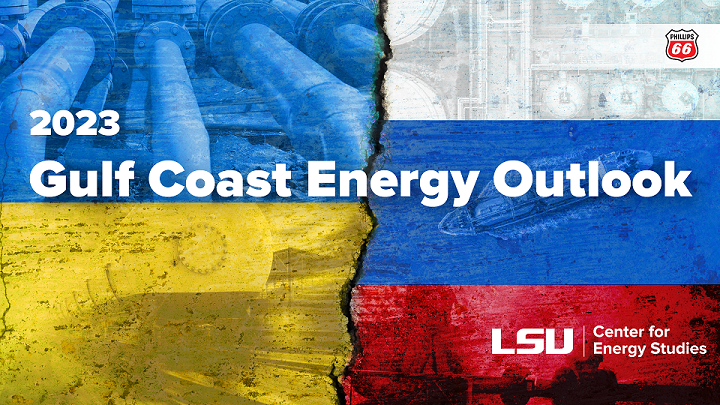 On November 16, 2022, the LSU Center for Energy Studies released the 2023 edition
of the Gulf Coast Energy Outlook (GCEO). As in previous years, this sixth edition
of the GCEO provides a comprehensive overview of the Gulf Coast region’s energy industry
outlook for the upcoming year. David E. Dismukes, executive director and professor,
and Greg Upton, associate professor, LSU Center for Energy Studies, authored the report.
On November 16, 2022, the LSU Center for Energy Studies released the 2023 edition
of the Gulf Coast Energy Outlook (GCEO). As in previous years, this sixth edition
of the GCEO provides a comprehensive overview of the Gulf Coast region’s energy industry
outlook for the upcoming year. David E. Dismukes, executive director and professor,
and Greg Upton, associate professor, LSU Center for Energy Studies, authored the report.
Last year’s GCEO addressed post-pandemic operational adjustments implemented by industry, as well as impacts of the 2020 and 2021 hurricane seasons. The 2023 GCEO addresses implications of the Russo-Ukrainian war on global energy markets and energy security. The impacts of decarbonization policies and the Inflation Reduction Act on corporate strategies are also considered.
Findings include
- Long-run energy demand growth will lead to increased U.S. energy exports; however, a global recession would reduce demand for energy products.
- An ongoing Russo-Ukrainian conflict will force global energy supply adjustments. Crude oil prices will gradually attenuate over the next several years, while Gulf Coast natural gas prices will likely remain elevated (relative to post-2008 historic trends) due to LNG export pressures.
- Supply chain constraints—caused by the economic recovery from COVID-19, sanctions resulting from the war in Ukraine, and continued Trump-era trade policies with China—will continue for the next year.
- Decarbonization policies will challenge existing Gulf Coast energy manufacturing but also create opportunities for the region to take the lead in developing low- and net-zero emissions products. Over the forecast horizon, the GCEO sees decarbonization creating considerable regional capital investment opportunities.
- Drilling activity will continue to increase but is unlikely to return to pre-pandemic levels. Oil production is expected to reach pre-pandemic levels over the forecast horizon, a sign of continued efficiency improvements.
- Both oil and natural gas prices are anticipated to fall over the coming year. While long-run oil prices are anticipated to converge back to pre-Russo-Ukrainian war levels, natural gas prices will likely settle at average levels higher than those seen over the past decade.
- Both oil and natural gas production in the region are anticipated to experience a decade of growth despite the fact that oil and natural gas prices are both in backwardation, (i.e. expected to decline over the forecast horizon).
- Significant investment in crude oil pipelines is likely not needed at this time due to the investment in pipeline infrastructure over the past decade.
- While solar capacity will likely experience significant growth over the next five or so years, it is anticipated to be a small share of total electricity generated for the foreseeable future.
- As much as $175.4 billion in new energy manufacturing investment activity will occur through 2030, representing a $15 billion, or 7.9 percent, reduction in total regional capital investment relative to last year’s GCEO over a comparable period of time.
- Production in the refining industry has rebounded to pre-pandemic levels and is anticipated to continue into the future, although downward revisions may be needed if a serious global economic contraction arises in the upcoming year.
- By the second quarter of 2023, Louisiana is expected to gain about 3,500 jobs. Texas is forecasted to gain about 12,200 upstream jobs between August 2022 and the second quarter of 2023; however, these model results are not anticipating employment in either state to reach pre-COVID levels over the forecast horizon.
October 31, 2022
Wang Honored for Outstanding Service
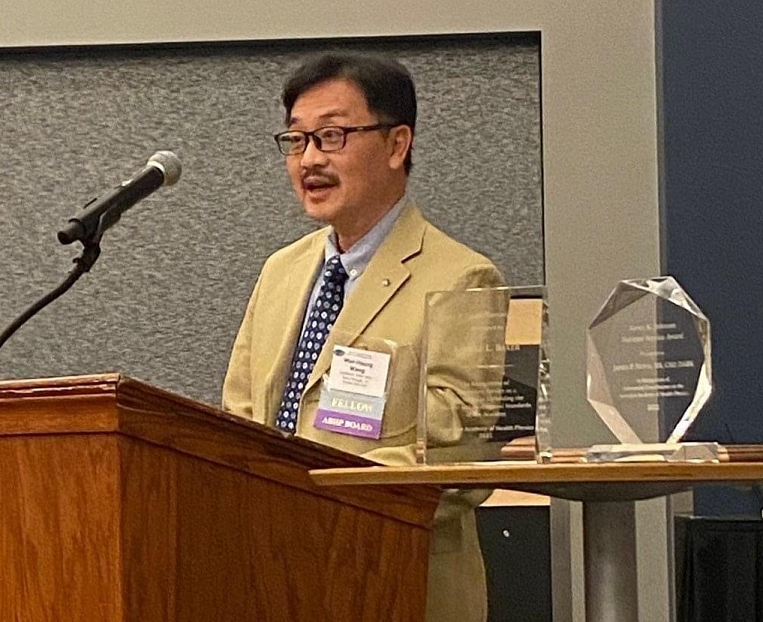 The American Board of Health Physics (ABHP) has awarded LSU Center for Energy Studies
Professor and Radiation Safety Office Director Dr. Wei-Hsung Wang the 2022 Williams
A. McAdams Outstanding Service Award. The award, given annually since 1989, honors
a certified health physicist who has made significant contributions toward professionalism
in health physics and to the certification process. See the ABHP announcement.
The American Board of Health Physics (ABHP) has awarded LSU Center for Energy Studies
Professor and Radiation Safety Office Director Dr. Wei-Hsung Wang the 2022 Williams
A. McAdams Outstanding Service Award. The award, given annually since 1989, honors
a certified health physicist who has made significant contributions toward professionalism
in health physics and to the certification process. See the ABHP announcement.
Established in 1959, the ABHP grants professional certification in the field of health physics. The certification process is accredited by the Council of Engineering and Scientific Specialty Boards. Health physics is the area of environmental health engineering and public health that engages in the safe use of ionizing and non-ionizing radiation in order to protect individuals, the general public, and the ecosphere from potential harmful effects of the radiation. The health physicist is responsible for safety and security aspects in the design of processes, equipment, and facilities utilizing radiation sources as well as for the adequate disposal of radioactive waste so that radiation exposure to personnel will be minimized and will at all times be within regulatory limits.
Wang is a member of the ABHP and Fellow of the Health Physics Society. He has served on various advisory capacities for both federal and state government agencies, including the U.S. Environmental Protection Agency, the U.S. National Oceanic and Atmospheric Administration, the U.S. Nuclear Regulatory Commission, the Louisiana Department of Environmental Quality, and the Louisiana Department of Health.
October 20, 2022

CES Presents Gulf Coast Energy Outlook 2023
On Wednesday, November 16, 2022, 10 a.m. - 11. a.m., the LSU Center for Energy Studies will host a free Zoom webinar as it launches the 2023 edition of the Gulf Coast Energy Outlook (GCEO). As in previous years, this sixth edition of the GCEO will provide a comprehensive overview of the Gulf Coast region’s energy industry outlook for the upcoming year.
GCEO authors Dr. David E. Dismukes, CES executive director and professor, and Dr. Greg Upton, CES associate professor, will present their findings.
The GCEO 2023 addresses the following:
- How has the war in Ukraine impacted energy companies and consumers locally?
- How will the Inflation Reduction Act (IRA) and Infrastructure Investment and Jobs Act (IIJA) impact the energy sector?
- What are crude oil and natural gas prices likely to do in the near future?
- How will crude oil and natural gas drilling and production change over the next year and beyond?
- What is the outlook for energy and industrial capital investment for the region?
- What is the outlook for employment in oil and gas extraction and refining and chemicals in Louisiana and Texas?
Registration for the free Zoom webinar is now open.
August 22, 2022
The Center for Energy Studies seeks applicants at the Assistant Professor-Research or Associate Professor-Research rank. We seek motivated individuals with strong oral and written communication and applied research skills in such areas as, but not limited to, electric power industry analysis, electric power systems modeling, conventional/unconventional oil and gas development, industrial energy usage, energy infrastructure, energy finance, energy law and regulation, renewable energy, energy efficiency, public policy and regulation of energy, energy in transportation, carbon capture and sequestration, hydrogen and/or other energy and environmental systems modeling.
See job opportunity announcement.
June 30, 2022
Dismukes on On Par with the President
CES Executive Director and Professor David Dismukes appears on the June 30 episode of On Par with the President, a podcast hosted by Louisiana State University President William F. Tate IV. In this segment, Dismukes discusses gasoline prices, energy, the global impact of Louisiana’s energy industry, and more.
The On Par podcast features LSU students, faculty, or staff who are at the very top of their game about their journey to success, setting and fulfilling goals, creating a legacy, and a variety of other topics.
|
|
June 21, 2022
Workshop Addresses La. Energy Climate Solutions
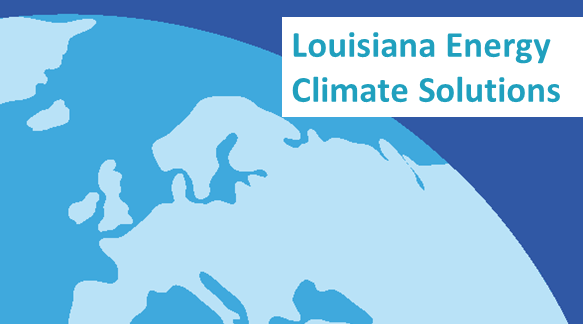 On June 21, the Center for Energy Studies, Louisiana Mid-Continent Oil and Gas Association
(LMOGA), and the Consumer Energy Alliance hosted the Louisiana Energy Climate Solutions
Workshop. The event featured a series of panel discussions and presentations addressing
Louisiana energy, anchored to pillars of the Louisiana climate plan—carbon capture,
utilization, and storage (CCUS), hydrogen, solar, and offshore wind—with an emphasis
on infrastructure, investment, and incentives to promote economic growth in energy
transition.
On June 21, the Center for Energy Studies, Louisiana Mid-Continent Oil and Gas Association
(LMOGA), and the Consumer Energy Alliance hosted the Louisiana Energy Climate Solutions
Workshop. The event featured a series of panel discussions and presentations addressing
Louisiana energy, anchored to pillars of the Louisiana climate plan—carbon capture,
utilization, and storage (CCUS), hydrogen, solar, and offshore wind—with an emphasis
on infrastructure, investment, and incentives to promote economic growth in energy
transition.
The event began with a presentation by Mike Sumrow of GHD Energy Services on CCUS
principles, in which he stressed that CCUS is critical to the energy transition and
that it will be necessary to meet the goals of the U.N. Climate Change Conference
in Glasgow (COP26). He notes that offshore CCUS is not new and that the Gulf of Mexico
has a great deal of capacity for CO2 sequestration. Blue hydrogen can support immediate
decarbonization but only when
enabled by CCUS, and that “given current costs…, renewables can more effectively be
used to displace power from fossil fuels.”
Legal challenges to decarbonization efforts were discussed by Bryant Bremer, Partner, Kean Miller. He noted that common arguments against CCS include its expense, risks for safe storage, whether it would be effective against climate change at this late stage, and doubts regarding CCS advancing the elimination of fossil fuel usage.
The event also included a panel discussion on hydrogen, considered a leading clean energy source due to its ability to be produced with low- to no-carbon emissions, emit zero CO2 emissions at consumption, provide long-term storage of renewable energy, and serve as an energy transport medium. Panelists were Russell Richardson, Sr. Vice President, Business Development, Baton Rouge Area Chamber, Jonathan Flynn, CF Industries, and Mike Sumrow, GHD.
A featured presenter was Dr. Emily Grubert, Deputy Assistant Secretary for the Office of Carbon Management, U.S. Department of Energy, who discussed DOE’s current goals: 50 percent emissions reduction by 2030; CO2 emissions-free power sector by 2035; and net zero emissions economy by no later than 2050. In its effort to minimize environmental and climate impacts of fossil fuels from extraction to use, DOE has identified seven priority technology areas: point source carbon capture; CO2 removal; CO2 conversion into products; reliable CO2 storage; hydrogen production; critical mineral production from industrial and mining waste; and methane mitigation.
Walt Musial, Principal Engineer, NREL, and Representative Joe Orgeron, Louisiana House of Representatives, discussed offshore wind opportunities in the Gulf of Mexico. Musial noted the advantages of and challenges to development. Advantages include the shallow U.S. waters, which allow for lower substructure costs, the proximity to oil and gas infrastructure, and the warmer waters and lower sea states that can serve to decrease operating costs and allow for easier turbine access. Challenges include hurricane risks, low average wind speeds, and soft soil, which limits substructure options and can increase costs. Orgeron discussed a bill filed during the 2022 legislative session that allows offshore wind leasing in state waters, or up to three miles off the shore. The bill extends limits on oil and gas leases to up to 25,000 acres to provide room for large wind turbines and allow the state space for pilot projects in state waters. In June, the governor signed the bill, which also gives the state a share of profits generated by wind farms.
The final session of the day addressed developments in solar energy. The panel featured Justin St. Marie, Senior Manager, Origination, Invenergy, and Chelsea Howard, Executive Director, Renewable Origination, NextEra, and was moderated by Randy Young, Partner, Kean Miller. Topics included how increased gas, power, and renewable energy credit prices are expected to support customer demand for renewables, even with higher near-term input costs; solar companies’ goals for Real Zero carbon emissions; Florida Power and Light’s efforts in decarbonization; and commercial structures in corporate renewable procurement.
Presentation materials are available upon request. Email ces@lsu.edu.
April 20, 2022
New Report Provides Policy Makers Guidance on Plugging and Abandoning Offshore Wells
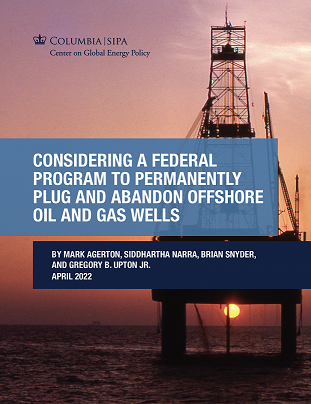 Center for Energy Studies faculty have collaborated on a new paper that examines offshore
well plugging and abandoning (P&A) liabilities and provides guidance to federal policy
makers during the formulation of P&A programs. Part of an oil and gas research initiative
at Columbia University’s Center on Global Energy Policy, the study identifies at least
three objectives of potential P&A programs: reducing future financial P&A liability
for tax payers, lowering environmental risk, and preserving or increasing employment
while reducing greenhouse gas emissions.
Center for Energy Studies faculty have collaborated on a new paper that examines offshore
well plugging and abandoning (P&A) liabilities and provides guidance to federal policy
makers during the formulation of P&A programs. Part of an oil and gas research initiative
at Columbia University’s Center on Global Energy Policy, the study identifies at least
three objectives of potential P&A programs: reducing future financial P&A liability
for tax payers, lowering environmental risk, and preserving or increasing employment
while reducing greenhouse gas emissions.
Findings include:
- As of the end of 2020, approximately 22,000 offshore oil and gas wells in the United States were not permanently P&Aed. The cost to P&A all of these wells is estimated at approximately $47 billion.
- Studies show that, because leaks from wells in shallow water and closer to shore pose greater environmental risks than those from wells farther offshore, and because P&Aing deeper-water wells more expensive, the cost/benefit ratio of P&Aing wells nearer to shore is more favorable than that for offshore wells.
- P&A costs associated with certain inactive wells in shallow waters that are not likely to resume production is estimated at $8.3 billion.
- Over a 10-year period, approximately 10,500 jobs per year could be created through a P&A program for shallow-water wells.
- Oil and gas production is not expected to be impacted because the wells that would likely be P&Aed no longer produce significant quantities of hydrocarbons.
Authors are
- Mark Agerton, assistant professor, University of California-Davis Department of Agricultural and Resource Economics and nonresident scholar, Center for Energy Studies, Rice University’s Baker Institute for Public Policy;
- Siddhartha Narra, research associate, LSU Center for Energy Studies;
- Brian Snyder, associate professor, LSU Department of Environmental Sciences; and
- Gregory B. Upton, Jr., (corresponding author), associate professor, LSU Center for Energy Studies.
Posted March 29, 2022
Upton, Nehiba Provide Comment on EPA's Proposed RFS Small Refinery Exemption Decision
 In December 2021, the U.S. Environmental Protection Agency (EPA) proposed to deny
more than 60 pending small refinery exemption (SRE) petitions from small refineries
that were requesting an exemption from the Renewable Fuel Standard (RFS) program.
The RFS is a federal program that requires transportation fuel sold in the United
States to contain a minimum amount of renewable fuels, such as ethanol, blended into
the fuel purchased by consumers.
In December 2021, the U.S. Environmental Protection Agency (EPA) proposed to deny
more than 60 pending small refinery exemption (SRE) petitions from small refineries
that were requesting an exemption from the Renewable Fuel Standard (RFS) program.
The RFS is a federal program that requires transportation fuel sold in the United
States to contain a minimum amount of renewable fuels, such as ethanol, blended into
the fuel purchased by consumers.
Center for Energy Studies Associate Professor-Research Greg Upton and Assistant Professor-Research Cody Nehiba provided an opinion on two specific claims made by the EPA in its proposal. Their expert opinion was submitted to the EPA in Docket No. EPA-HQ-OAR-2021-0566.
Perkins Coie LLP, 20 small refineries with diverse geographic dispersion, and three anonymous academic reviewers were given the opportunity to review and provide feedback on this report. The analysis and opinions expressed, however, are those of the authors alone.
Posted January 10, 2022
Decarbonization Topic of ASSA Session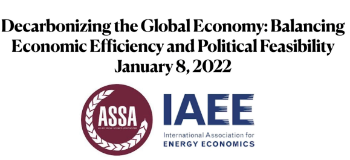
At this year’s meeting of the Allied Social Sciences Association (ASSA), Center for
Energy Studies Associate Professor Greg Upton, and University of California-Davis
Professor Mark Agerton organized, and served as moderators for, a panel discussion
titled, “Decarbonizing the Global Economy: Balancing Economic Efficiency and Political
Feasibility.” The panel, hosted by the International Association for Energy Economics
(IAEE), was held virtually on Saturday, January 8. Panelists included Robert N. Stavins,
Harvard University; Barry Rabe, University of Michigan; Adam Sieminski, King Abdullah
Petroleum Studies & Research Center (KAPSARC); and Garret Graves, United States House
of Representatives.
Panelists discussed decarbonization policies in terms of both economic efficiency
and political feasibility. Panelists also brought a variety of perspectives, including
economics, political science, industry, and government.
The discussion was recorded and is available on the CES YouTube channel.